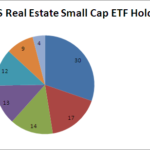Every alternative has its costs. Exchange-traded funds make investing less expensive, arguably less thoughtful, and certainly much less profitable for the investment management industry. From the perspective of an individual investor, these are all very good things.
We often miss what the popularity of indexing tends to hide.
Separating the Index from the Investment
BusinessInsider ran a recent story on the subject of earnings in the S&P500 index. The writer found that without Apple (AAPL), the S&P500 index as a whole would report zero earnings growth in 2012. The tech industry as a whole has become such a massive part of the S&P500 index that Apple essentially decides the direction for the whole market.
And technology isn’t really all that hot outside of Apple’s single growth story. The same author notes that the technology sector will show lower earnings in 2012 than it did in 2011, despite high flying individual companies like Apple.
It’s incredible to think that a single-stock in a 500 company index could have this much effect on total returns. Investing in the S&P500 index for the first few months of 2012 is a lot like purchasing a few shares of Apple for your own portfolio and keeping the rest in cash. Without Apple’s massive earnings growth and incredible returns in the common equity, investors have little to cheer for. Earnings are flat, and appreciation is little with the exception of a single firm in a single industry – Apple.  Apple’s Dividend is notable this year, as are some analysts finally calling for a slowdown (in a sea of $1 Trillion valuation calls), and margins may be compressed by absurd complaints about worker conditions assembling Apple products, but whether this single stock can continue to carry the entire index remains to be seen.
The Last Internet Bubble
Apple’s dominance is a serious market event. The last time the S&P500 index derived 10% of its 3-month returns from a single company was in 2000. The first time was one year earlier in 1999. It was then that major indexes and the few ETF offerings on the market began to input position limits into their investment qualification tests. Today, no stock can make up more than 5% of the S&P500 index, although holdings are usually held to a much smaller part of the portfolio due to a market cap weighting.
Apple is an anomaly. It’s crushed through two index limitations that were designed to thwart a stock like Apple from distorting the value of the index. Few companies are large enough to hit the ceiling on diversification rules within the ETF. Being the largest company on American exchanges, Apple destroys this lingering qualification.
The rare feat is that Apple is also fast-growing. Few companies can sustain growth in the single-digits while maintaining a market cap greater than a billion dollars. Apple has maintained massive double digit growth all the way to $600 billion in market cap.
Re-Thinking the Indices
In light of Apple’s growth explosion and distortion of the S&P500 index (SPY), is it time to think about equal-weight indexes over the market cap weighted S&P500 index?  Some examples of equal-weighted ETFs include the Guggenheim S&P 500 Equal Weight ETF (RSP) and the newly launched Direxion NASDAQ-100® Equal Weighted Index Shares (QQQE).  As you might imagine, SPY has outperformed RSP over the prior year period, with a 4% gain for RSP vs. a flat return on SPY.  However, over the prior 5-Year period, RSP outperforms with a 2.5% gain vs. a loss of 4.2% for SPY.  Bear in mind though, that RSP has a higher expense ratio at 0.4%.  One method to employ if unsure of Apple’s future contributions to index returns could be to go equal-weight in large part, with an out of the money Apple option to avoid missing another 100% move (optionsxpress is a great platform for trading options by the way).  But then again, markets are efficient, right?
Are investors really diversified if it is the single largest holding and largest stock on the market that is keeping earnings growth afloat?
Disclosure: No position in any ETFs covered in this article.










{ 0 comments… add one now }